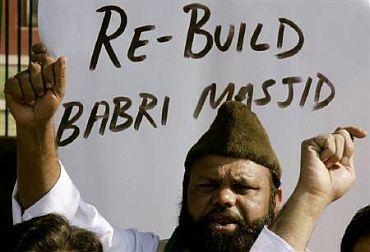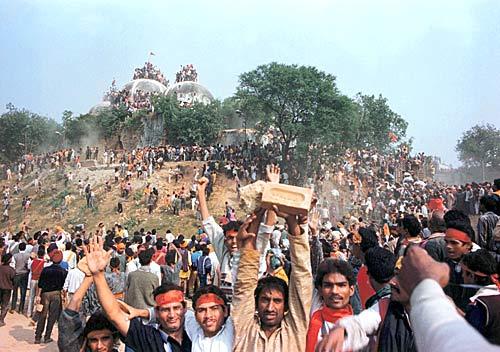<>By Mudassir Ahmad Qasmi for TwoCircles.net
On the 24th anniversary of Babri Masjid demolition, we appeal to the Supreme Court of India for a speedy judgment so that political mafia would not continue to play their political games with the sentiments of the people in the name of religion
It was not merely a communal insurgency which claimed hundreds of innocent Muslim lives across India; rather it was a big blow to Muslims religious identity. It was also a blatant attack on the secular ethos of the country and the two communities have been at loggerheads ever since the masjid was brought down. About 24 years back on 6 December 1992 evil forces demolished the historic Babri Masjid for political gain, and doing so they broke the hearts of about 180 million Muslims which always beat for Indian democracy. It fissured and ruptured the uneasy calm and harmony between the two communities and gave rise to animosities that are still to be doused.

Babri Masjid demolition also resulted in bloody riots in several major cities of the country and Mumbai and Surat riots in December and January 1992-93 surpassing all previous limits in brutality, killing and raping. By any account, Babri Masjid’s demolition and subsequent riots remain a shame for modern secular India.
A well-known Islamic scholar of India, the president of a faction of Jamiat Ulama-e Hind, Hazrat Maulana Syed Arshad Madni use to say in his speeches that the root of all the post-1992 communal violence is the demolition of Babri Masjid.
Thus, it is clear that the polarisation of the two communities by nefarious elements for short-term political ends was not only political chicanery as it instigated the Hindu gullible masses to see the destroying of an icon as a false template of a resurgent Hindu identity. This Hindu resurgence was created to correct the so-called wrongs of history in which benign Muslim leaders were presented as those who trampled on the religious ethos of the majority community. The masses were lured by obscurantist ideas and they saw in the ‘present moment of the past’ a dubious and dangerous way of claiming their religious legacy.
The razing of the Babri Masjid marked a watershed moment in India’s cultural history as it tore the social fabric and the peaceful co-existence of Hindus and Muslims giving birth to widespread riots. It gave rise to a “paroxysmal cry from the midnight heart” and the festering wound on the community’s psyche has still to be healed.
Indian Muslims never feel ashamed on their decision not to leave India in 1947 and this was because Indian constitution confers on them full rights to enjoy their freedom of religion. On the contrary, a number of Pakistani Muslims still mourn their decision of adopting Pakistan as a separate country and the reason is obvious. But alas! A handful of communal minded people in India has always been trying to shatter the concept of one nation theory and consequently this insistent attempt to bait the Muslims (wrongly) for dividing the country compels Muslims to be on the defensive.

But seers in the Muslim camp have seen this battering of their religious identity as an act of Almighty Allah to rouse them from their slumber so that they become proactive and true Muslims and do the work of dawah to make their mark on the wishy-washy beliefs of the other communities. The demolition of the Babri Masjid was the part of a political conspiracy to ascend to the throne of Delhi and in reality, it has no connection with Hindu belief. It was a propaganda that Babri Masjid was built on the birthplace of Lord Rama and gradually this false theory was attached to common Hindus sentiments. A religious belief is not something floating about in the air. To be considered a religious belief it must be specifically and clearly mentioned in a religious text.
If there was a Temple there, how come Tulasidas never mentioned it?
The claim that Hindus believe that the spot occupied by the Babri Masjid is the precise birthplace of Rama does not find any such textual reference or support in the Hindu scriptures. Half a century after the construction of the Babri Masjid, the biggest devotee of Rama, Tulasidas, who lived in Ayodhya, wrote numerous books, including the Ramcharitmanas, but he made no reference at all in any of his writings to any temple standing on the spot occupied by the Masjid or to support the claim that the spot marked the birthplace of Rama. Nor did he claim that a temple had been destroyed to build the Masjid.
There is a million dollar question that can a masjid be built on a wrongly occupied land. The answer is so easy that an illiterate Muslim will also say “NEVER”. A renowned Islamic scholar Maulana Abdul Hameed Nomani of Jamiat Ulema-e Hind wrote in his well-researched article that till date, no compelling evidence has been provided to prove that the Babri Masjid was built after destroying a temple. It is a shariah duty binding on Muslim rulers to build masjids for their Muslim subjects to pray in. Accordingly, Babar arranged for the Babri Masjid to be built in Ayodhya under the supervision of Mir Baqi. According to the shariah, a masjid cannot be built on land owned by someone else. That is why the land where the Babri Masjid stood must either have been bought from someone or else built on empty land or land that had no legal private owner and that, therefore, was technically owned by the state. In either case, Babar’s decision cannot be said to be un-Islamic or erroneous.
The masjid stood on that spot for centuries, and this itself is proof as to who its rightful owner is. For centuries, Islamic worship was offered there, and that itself is sufficient evidence of it having been a masjid. To back this claim, there is no need for additional evidence, such as a written will, the names of those who had given the land in waqf for the masjid, and so on. Rather, it is for the opposite party to prove that the masjid was not built on state land and that, instead, the land actually belonged to someone else that was, as they allege, forcibly taken by either Mir Baqi or Babar in order to build the masjid.
After going through the above-mentioned facts and analysis, even a layman will conclude that the judgment of the Lucknow bench of the Allahabad High Court in Ayodhya title suit, which was delivered on September 30, 2010, is not acceptable for Muslims. The three-judge bench – comprising Justice S U Khan, Justice Sudhir Agarwal and Justice D V Sharma – ruled in a majority judgment 2:1, that there be a three-way division of the disputed land – one-third for the Sunni Waqf Board, one-third for the Nirmohi Akhara and one-third to the party for ‘Ram Lalla’. Each of the three judges gave a summary of his own.
Muslims had made it clear that the High Court verdict was not acceptable to them as it was based on faith and not on evidence. Judgment upholds the faith of one community over the other while ignoring evidence. The court judgment violates basic values of the Constitution – as it sacrifices the principles of secularism on the altar of dubious faith. The observation of Indian Muslims is that the HC judgment suffered from a number of infirmities and, therefore, it was the obligation of the Muslims to challenge it in the apex court, which they did.
Muslims cannot surrender their claim on Babri Masjid, because the commandments of the shariah cannot be ignored. The shariah has arranged that as soon as a place becomes a masjid its ownership is wholly transferred from out of the hands of human beings. Once a place becomes a masjid, it remains so forever, even though it might become dilapidated or is no longer prayed in or even if no Muslims live any longer in its vicinity. Even in such conditions, it cannot cease to be a masjid, and no one can change its status.
There are some so-called Islamic scholars and peacemakers in India who try to convince Muslims to leave the Babri Masjid place for the sake of mutual harmony. This is one of the several attempts by those who pose to holier-than-thou and hanker to be part of the mainstream. It is ridiculous that on the one hand the opposite party is not ready to leave even an inch of the so-called temple where Babri Masjid was standing for centuries and, on the other hand, Muslims are forced to compromise by giving up the claim and, instead, forced to take a new piece of land in place of the masjid.
Let us take into account the status of the masjid in Islam. In the well-known fiqh compendium Shami it is mentioned that if people no longer live in the vicinity of a masjid and, therefore, this masjid is no longer in use, even then the masjid remains a masjid, and will remain so till the Day of Judgment. Fatwas have been given based on this principle, which argument has the backing of the leading figures of the established schools of Muslim jurisprudence, including the Imams, Abu Hanifa, Mailk, Shafi and Ahmad Bin Hanbal.
In other words, it can be said that there is a consensus or ijma among the Muslims on the matter. Accordingly, the noted Muslim jurist Allama Hafiz Ibn Hamam wrote in the Fateh al-Qadeer that it is a duty binding on Muslims to protect, as far as they possibly can, even an unused and dilapidated masjid. This point is mentioned in numerous other important books of Muslim jurisprudence, such as Al-Bahr al-Raiq, Al-Durr ul-Mukhtar ma Radd-il Muhtar, Fatawa Alamgiri, etc.
An individual or an organisation does not own a masjid, and that is why it cannot be transferred to anyone else’s control or ownership. Nor can it be bought or sold. In short, according to Muslim jurisprudence, once a piece of land becomes a masjid this status cannot be changed in future.
Though the legal battle over the ownership of the Babri Masjid will continue, it needs to be noted that the concern of the Muslims with regard to the Babri Masjid stems from their desire to protect their places of worship in accordance with the rules of the shariah, and not from any identification with or support for Babar or from association with a particular bit of land. That is why to seek to counterpoise Rama against Babar is a mischievous conspiracy to scuttle the real issues that are central to the ongoing controversy.
Will Muslims accept the Supreme Court verdict?
The last and the final question in this issue is that if the Supreme Court gives a verdict against Muslims, will it be acceptable for them. The answer is quite clear that after going through the concrete evidence in support of Muslim claims, most hopefully the verdict will come in favour of Muslims but in the case, it is otherwise, Muslims will accept it, though actually, it will be a mere compromise. When the wider interest of public peace and harmony is at stake, it is advisable not to rake up issues that can lead to greater ‘fitnas’.
However, the sorry legacy of the Babri Masjid demolition cannot be wished away even on the insistence of the well-meaning among the majority community for it has ripped apart the social and cultural glue that had bound the two communities and it will, unfortunately, continue to bedevil the peaceful co-operation and relations between the two communities. On this 24th anniversary of Babri Masjid demolition, we appeal to the Supreme Court of India for a speedy judgment so that political mafia would not continue to play their political games with the sentiments of the people in the name of religion.

